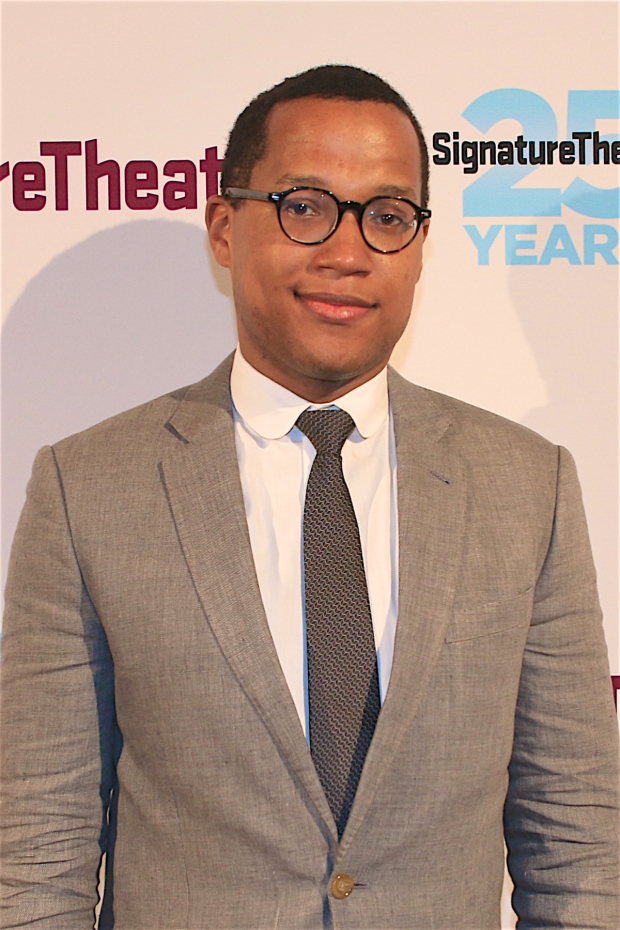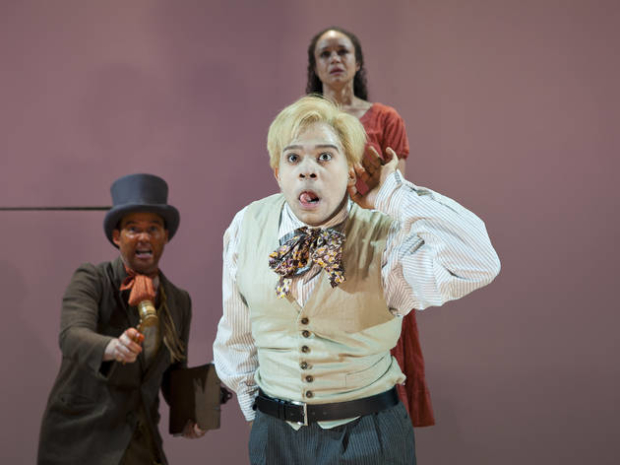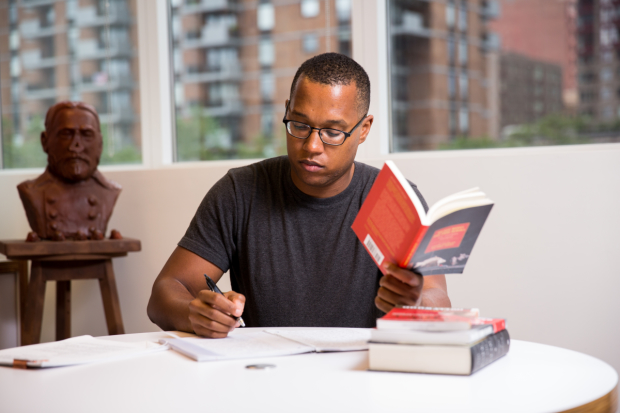Branden Jacobs-Jenkins' Wild Ride From Critical Disaster to Cultural Luminary
The newly minted “genius” of American theater discusses his latest play and why the arrival of ”Hamilton” isn’t nearly as revolutionary as you might think.

(© Tricia Baron)
Playwright Branden Jacobs-Jenkins sat in Clinton Hill's Outpost Café surrounded by coffee-swilling Brooklynites tapping furiously on their laptops. A sea of glowing Apple logos ever so slightly augmented the mellow lighting of the room as Jacobs-Jenkins recalled the hours he once spent here doing the exact same thing: "This is actually where I wrote Neighbors," he said, referencing his first professionally produced work. "This was the only café in the area at the time, and there was one other woman who would come in to write on the weekends. She was also working a play," he paused for dramatic effect. "It was Annie Baker."
Baker is the 35-year-old Pulitzer Prize-winning author of The Flick and John. Jacobs-Jenkins, 31, is a Pulitzer finalist (for Gloria) and Obie winner (An Octoroon and Appropriate). Both now teach playwriting at Hunter College, and both exist at the center of a constellation of young playwrights that includes Stephen Karam (The Humans), Samuel D. Hunter (The Harvest), and Tarell Alvin McCraney (Choir Boy). Jacobs-Jenkins observes, "I seem to belong to a boom moment of playwrights, and I'm always curious about how we all got here and what comes next."
In the immediate future, what comes next for Jacobs-Jenkins is the kind of financial security rarely enjoyed by American playwrights: In September he was inducted as a MacArthur Fellow, a distinction that comes with a $625,000 no-strings-attached award (commonly known as a "genius grant") that is disbursed in quarterly installments over five years. The announcement of each year's class of geniuses has increasingly become an event, like the Academy Awards for the American intelligentsia. "I didn't know my phone could hold so many messages. It felt like every single person I had ever met was reaching out," he says about the day the fellowship was announced. "That is a human sensation that I don't think people really know how to cope with."

(© Pavel Antonov)
It is a particularly strange and gratifying moment for Jacobs-Jenkins, considering his career as a playwright was almost derailed six years ago: Just three months after the New York Times printed a scathing review of Neighbors (the play Jacobs-Jenkins wrote at Outpost, which provocatively featured a cast of actors in blackface), an actor in the P.S. 122 workshop of An Octoroon circulated an e-mail in which he described the plays as "a piece of crap that wouldn't hold a candle to some of the community theater I did in high school." That e-mail was subsequently printed in the Village Voice.
Jacobs-Jenkins fled to Germany after this traumatic one-two punch. "I lived in Berlin for two years and I was going to apply for my immigration to stay and work as a busboy, or whatever I needed to do," he recalls. "But then three magical things happened all at once." The first was that he was awarded the Helen Merrill Award, which he describes as a "rescue grant." He also won the Vineyard Theatre's Paula Vogel Award for Emerging Playwrights. "I thought, I can take this money and try to live in Germany for another year, or I can go back and try to close up some loose ends." An opportunity for a tiny but important downtown theater led him to choose the latter.
"Soho Rep. was the third factor that really came in and saved my career, because they were asking about this thing I was working on when no one else was interested," he says. That thing ended up being An Octoroon, a modern riff on Dion Boucicault's 1859 melodrama about a Southern plantation owner in love with a slave who is one-eighth black. "I thought about turning it into an essay, but [Soho Rep.] still thought it was a play and invited me to do a workshop," he says. "And that's really what ended up changing my life." An Octoroon received an avalanche of critical praise when it debuted with Soho Rep. in 2014, eventually transferring to the larger Polonsky Shakespeare Center for a run with Theatre for a New Audience. The consensus was that it was most decidedly not "a piece of crap."
That's not to say that Jacobs-Jenkins is particularly interested in consensus. In the video interview for the MacArthur Foundation, Jacobs-Jenkins states, "One of the most incredible and important things about the theater is that we're creating a safe space for all feelings, but especially ugly feelings." This wry appropriation of language typically used to suppress conflict and discomfort (especially on college campuses) seems to be at the heart of his approach to the theater: "As an educator, I think a lot about what a 'safe space' is, exactly. Why are you owed a safe space? I think you have to earn it," he argues. "The theater is a space where we're all making an agreement to be together. Pity and terror are two of the ugliest feelings you can feel, and they are essential to drama."
His impulse to challenge conventional wisdom extends to the professional theater as well. In the year of #OscarsSoWhite, the New York theater likes to think of itself as far more diverse than its cinematic cousin, Hollywood, but Jacobs-Jenkins undercuts that notion, observing, "The Obama presidency was bookended by the same events in the theater: Lin-Manuel Miranda winning a Tony for best musical and the best play Tony going to a white family drama featuring one ethnic actor who rarely speaks." (The 2016 top Tony Awards went to Hamilton and The Humans, and in 2008 they went to Miranda's In the Heights and Tracy Letts' August: Osage County.) Recognizing this Jacobs-Jenkins asks, "Did anything happen for us in the theater these last eight years?"
To be fair, he thinks that even if the product being sold on Broadway hasn't changed much, the artists coming up into that level of theater definitely have: "We were all living in the vacuum of August for a while, but with people like Tarell [Alvin McCraney] and Dominique [Morisseau] and Jackie Sibblies Drury, and Robert O'Hara working, there's an emergence where there wasn't one before."

(© John D. and Catherine T. MacArthur Foundation)
Jacobs-Jenkins is unquestionably a part of that emergence as he keeps putting out new work. His next play, Everybody, is set to debut with Signature Theatre Company in February 2017. It is based on the 15th-century morality play Everyman, in which actors portray roles like death, friendship, and family. "I'm just trying to make a play that puts abstractions onstage. Is that a thing I can still sustain?" he asks, admitting, "I may be reacting against what I'm sensing is this super valuing of realism."
Admittedly, medieval Catholic theology is an unusual topic for a contemporary play, but presenting the unexpected may be part of what makes Jacobs-Jenkins such a thrilling playwright. No one was seriously thinking about Dion Boucicault before 2014, but thanks to An Octoroon, he has been reintroduced as an important American theatrical voice. With a sensibility that is simultaneously transgressive and deeply informed by history, Jacobs-Jenkins is sure to keep changing the game for the American theater in fresh and exciting ways.









